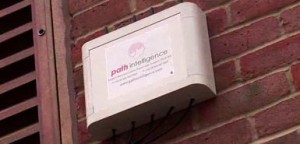Is that REALLY just a phone you are carrying?
Everyone is getting kinda use to the fact that more and more “stuff” is being packed into cellphones today. Nearly, every phone has to have a camera as well as texting capabilities and Internet browsers. Most are also calendars, calculators, stopwatches etc, etc. My new phone even has a built-in GPS receiver!
 Now comes along a REALLY scary story from the UK about the capability of ordinary cellphones (not via GPS) tracking your every move in retail establshments! According to report…”The technology can tell when people enter a shopping centre, what stores they visit, how long they remain there, and what route they take as they walked around.”
Now comes along a REALLY scary story from the UK about the capability of ordinary cellphones (not via GPS) tracking your every move in retail establshments! According to report…”The technology can tell when people enter a shopping centre, what stores they visit, how long they remain there, and what route they take as they walked around.”
“The surveillance mechanism works by monitoring the signals produced by mobile handsets and then locating the phone by triangulation – measuring the phone’s distance from three receivers.”
Note, you don’t do anything but carry the phone. BTW, if you didn’t realize it, cellphones continuously send small amounts of data back and forth to the network whether you are making a call or not. These are the signals used by this system.
Of course the system has a marketing purpose. “A shopping mall could, for example, find out that 10,000 people were still in the store at 6pm, helping to make a case for longer opening hours, or that a majority of customers who visited Gap also went to Next, which could useful for marketing purposes.”
In actual use at Gunwharf Quays in the UK “….managers were surprised to discover that an unusually high percentage of visitors were German – the receivers can tell in which country each phone is registered – which led to the management translating the instructions in the car park.”
Seems like an innocent enough system! So what if your local grocery store finds out that shoppers spend a lot of time wandering the vegetable aisles.
According to the manufacturer of the system “its equipment was [sic] just a tool for market research. “There’s absolutely no way we can link the information we gather back to the individual,” a spokeswoman said. “There’s nothing personal in the data.” The system “….does not identify the owner of the phone but rather the handset’s IMEI code – a unique number given to every device so that the network can recognise it.”
Here is the false sense of security. “Only the phone network can match a handset’s IMEI number to the personal details of a customer.” While this is technically true, consider the following possibility and how easy it would be for a store to ID you and your IMEI. The system says you are at the checkout and the store processes your purchase (credit, debit or shopping card), BINGO you’re made! In fact with this correlation, the store has even MORE info than the phone company. They can correlate all the data you provided for that shopping card and purchase habits collected in the account. BTW, they also have your photo from that handy surveillance camera at checkout.
This is a simple example. Now, just consider a divorce case or other legal action. Imagine a lawyer subpoena data records (locations, dates & times, and IMEI). “Is this your cellphone? Tell me Mr. Jones how often did you meet your mistress in front of the broccoli?”
So, is that JUST a cellphone you are carrying or a key for big brother.
Posted: May 30th, 2008 under General.
Tags: cellphone, location, market research, privacy, security, security threat, tracking



Comment from Matthew Botos
Time May 30, 2008 at 9:51 am
That’s some pretty precise triangulation; when my iPhone does the same as a poor man’s GPS, the best it can do is that I’m near the mall!
It’s good to know that the personally-addressed, in-mall advertising of Minority Report isn’t quite here yet, but the subpoena possibilities are a bit scary. What kind of precedents have been set with data retention and discovery for other trackable systems like Ezpass, RFID passports, and standard cell phone triangulation?